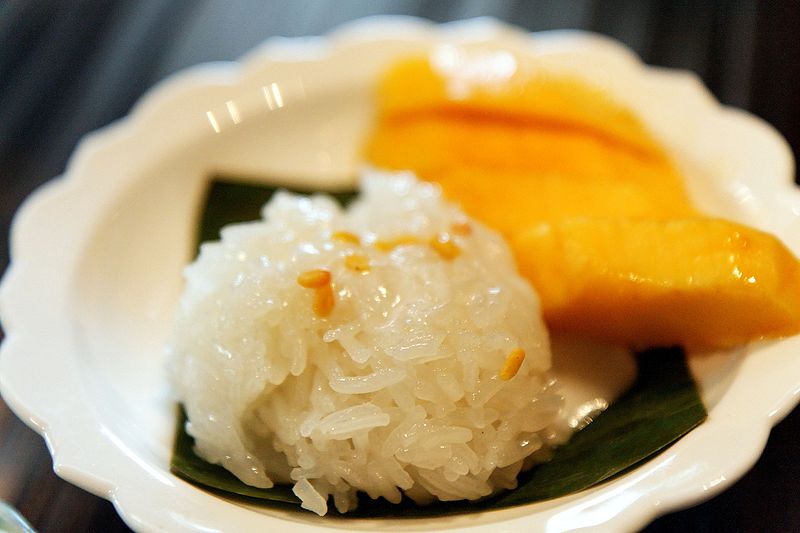Mango sticky rice, a Thai dish consisting of glutinous rice soaked in coconut milk with slices of mango on top, became viral online earlier this year thanks to Thailand born rapper Danupa “Milli” Kanateerakul.
Milli became the first Thai rapper to perform at Coachella, where she performed her song “Mango Sticky Rice ” while eating a bowl of the dessert on stage. After her performance, mango sticky rice went viral on social media and sales of mango sticky rice soared in Thailand. Thailand’s government even nominated mango sticky rice for UNESCO’s Intangible Cultural Heritage list. It is clear that the performance was not just a dedication to Milli’s favorite dessert, but also a testament to the significance of soft power, specifically gastrodiplomacy.
Right after Milli’s performance at Coachella, one of the world’s most popular music festivals, mango sticky rice exploded on social media. Google searches for the dessert surged up to 20 times. On Twitter #khanonieomamuang (mango sticky rice) was trending in Thailand, and #MILLILiveatCoachella was trending worldwide with over 1.39 million tweets.
Thai citizens also applauded Milli’s performance for representing Thailand in a positive light on a global stage. Nongnapath, a Thai illustrator based in Bangkok, Thailand told NBC News, “I like Milli eating mango sticky rice [onstage]so much. Because I’m Thai too, so I know and eat mango sticky rice since I was young.”
Suphakomkao Klaypongpan, a mango sticky rice customer in Bangkok, stated, “I normally love to eat mango sticky rice but…after watching Milli on stage, I am now eating it nearly every day.”
Milli’s performance not only made the dessert viral online, but also helped boost sales of the dessert in Thailand. In fact, Thanyarat Suntiparadorn, the owner of mango sticky rice vendor Mae Varre, noted that online orders increased by 100%. There were so many orders that the owner had to shut down online orders throughout the day to keep up with the demand.
Other countries also took notice of Thailand’s dessert. Manop Kaeowongnukun, president of a mango growers association in Chacheong, claimed that countries abroad have shown interest in Thailand’s mangoes thanks to Milli. Previously, a kilogram of mangoes would range from 20-40 baht/kg, though now after Milli’s performance, prices have increased to 110 baht/kg.
Kaewongnukun claims that “mango sticky rice fever will help drive up consumption and thus prices.” Milli’s influence spread from vendors of the dish to mango growers in Thailand, showcasing the impact of cuisine and celebrities as tools for soft power.
The publicity around mango sticky rice was so widespread that even the Thai government took notice. Thai politician Pita Limjaroenrat posted on Twitter: “MILLI aka Thailand’s closest hope for soft power!” after Milli’s Coachella performance. The Thai government even decided to nominate mango sticky rice to UNESCO’s Intangible Cultural Heritage list.
According to UNESCO, the purpose of this list is to “help demonstrate the diversity of [intangible heritage elements]and raise awareness of its importance.” This is significant, because if the dish is recognized as an intangible heritage element, it will not only bring greater global awareness to the dish, but to Thailand as a whole.
By being on the list, Thailand can also receive other indirect benefits such as culinary tourism, which can help increase revenue to Thailand’s economy as more tourists decide to visit the country to experience the cuisine. The impact of Milli’s performance makes it clear that through the arts, countries can showcase their food and culture in a public, global manner made for wider audiences.
While it was not Milli’s intention to become a tool of soft power, she does have pride in her country and wanted to represent Thailand through her own eyes on stage. She said, “When you look at Thailand travel brochures, it’s always either giant statues, temples or floating markets. I’m not here to represent the conventional ‘Thainess’; I’m here to represent who I am as a Thai person…There are other aspects of Thai culture that often get overlooked and I want to make sure that my music reflects the essence of that.”
Milli did just that through her performance and the lyrics of her song “Mango Sticky Rice.” Her love of mango sticky rice and Thailand resonates throughout her song. In her lyrics she raps about the mangoes that one can only find in Thailand and expresses her love for the dessert when she raps lyrics like “sprinkle it with crunchy things. This foody goody mango sticky rice you can eat it eat…Juicy, tasty makes me greedy.” By creating a visible, positive representation of mango sticky rice, Milli crafted a positive image of Thailand while generating increased interest in the country around the world.
The Thai government’s quick capitalization on Milli’s performance was not the first time it has used its cuisine as a tool for soft power. In fact, gastrodiplomacy, a term used to describe the act of a country generating global interest in its cuisine to elevate its status and therefore increase tourism and revenue, was first coined to describe Thailand’s Global Thai initiative in 2002.
The initiative was created to increase the number of Thai restaurants around the world from 5,500 to 8,000. To achieve this, the government implemented different strategies such as sending Thai chefs abroad and offering loans to open up Thai restaurants. The goal was that by increasing positive representation of Thai cuisine, the country would enjoy benefits such as increased visibility, status, and revenue. Eventually the efforts paid off, as the number of Thai restaurants abroad increased from 5,500 to 15,000.
For Thailand, there is a concentrated effort for pushing soft power through gastrodiplomacy because it leads to an array of economic and status benefits for the country as whole. By making the country’s cuisine globally visible, Thailand can similarly become a visible force on the global stage.
Additionally, when people have positive associations with a foriegn country’s cuisine and its culture, they are also enticed to visit the country, driving up tourism revenue for that country. Gastrodiplomacy can also increase national pride in the country campaigning their cuisine, as evident in Thailand through the citizens’ positive reaction to Milli’s performance and the spike in mango sticky rice sales.
Milli’s Coachella performance is an example of how food can be a powerful force in the diplomatic sphere and be used to shape public perception, as Thailand has successfully been able to do and continues to do so with the sudden popularity of the mango sticky rice dish. Milli’s performance shows that celebrities are not just entertainers, but also ambassadors of their country. Milli represents how, as celebrities become increasingly visible thanks to social media, they will continue to be a force for soft power by representing their country and its products on a global scale.







